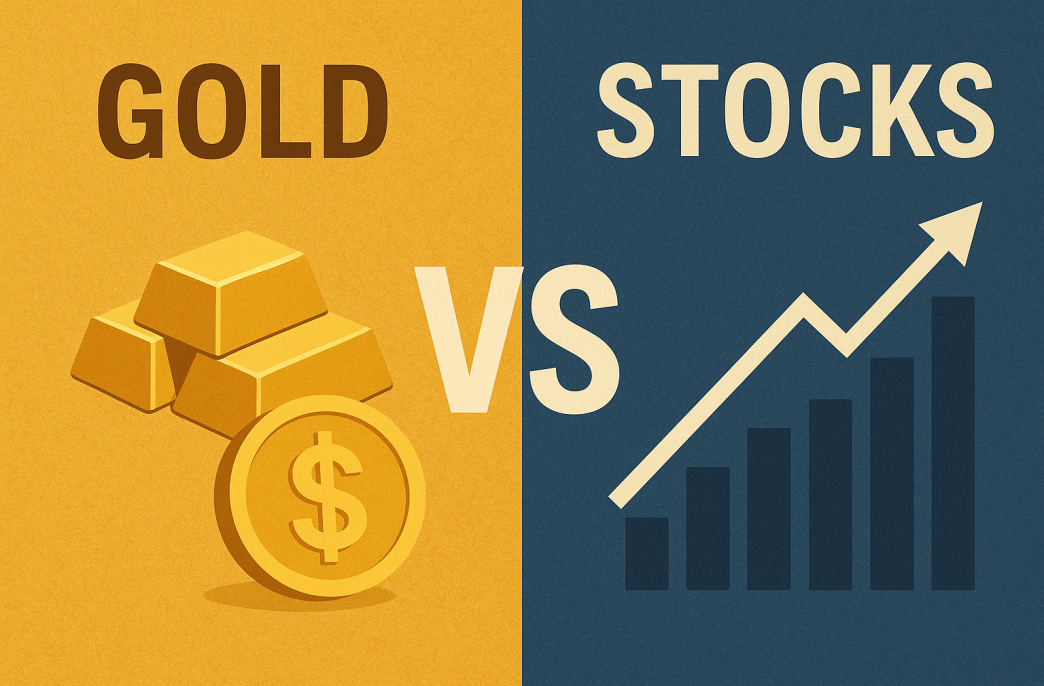Gold vs Stocks: Which option is the Better Investment option for You? Full details 2025 updated.
Gold vs Stocks: Better Investment?
When it comes to building wealth, most people in India usually think about gold or stocks. Gold and stocks are both well-known investments, but they work in very different ways. If you’re confused about where to put your money, this guide will help you understand the pros, cons, and long-term potential of gold vs stocks.
Table of Contents
Why People Invest in Gold
Gold has been considered a symbol of wealth and security for centuries. In India, it’s not just an investment but also a tradition. From weddings to festivals, gold plays an emotional role in people’s lives.
Advantages of Gold Investment
- Safe Haven Asset – During inflation, political instability, or market crashes, gold usually holds or even increases in value.
- Gold is simple to trade – whether it’s physical gold, ETFs, or sovereign gold bonds, you can buy and sell them without much hassle.
- Hedge Against Inflation – As prices rise, gold tends to keep its purchasing power.
Disadvantages of Gold Investment
- Low Returns in the Long Run – Gold’s average return over the last 20 years is around 8–10%, which is lower than stocks.
- No Passive Income – Unlike stocks that pay dividends, gold does not generate income.
- Storage and Security Issues – Physical gold carries the risk of theft unless stored in a bank locker, which may add extra costs.
Why People Invest in Stocks
Stocks represent ownership in a company. When the company grows and makes profit, its shareholders also benefit through capital appreciation and sometimes dividends.
Advantages of Stock Investment
- High Growth Potential – Historically, stock markets (like Sensex and Nifty) have delivered 12–15% annual returns in India over the long term.
- Dividend Income – Some companies pay regular dividends, offering an extra source of passive income.
- Easy Diversification – With mutual funds and index funds, you can spread your risk across different sectors.
Disadvantages of Stock Investment
- Market Volatility – Stock prices can rise or fall sharply in the short term, making them risky for conservative investors.
- Requires Knowledge and Discipline – To succeed, you need patience, research, and a long-term approach.
- Emotional Stress – Constant market fluctuations can lead to panic buying or selling.
Gold vs Stocks: A Direct Comparison
| Factor | Gold | Stocks |
|---|---|---|
| Risk | Low risk, stable value | High risk, volatile prices |
| Returns | 7–10% on average | 12–15% over the long term |
| Liquidity | High (can be sold easily) | High (stocks can be sold anytime) |
| Passive Income | No | Yes, through dividends |
| Best For | Safety, wealth preservation | Growth, wealth creation |
Which One Should You Choose?
Your choice really comes down to what you want to achieve, how much risk you can handle, and how long you plan to invest.
- If you want safety and stability, gold is a better option.
- If you want wealth creation and higher returns, stocks are the way to go.
- Ideally, a smart investor doesn’t choose one over the other — instead, they balance both in their portfolio.
Final Thoughts
Gold provides security, while stocks provide growth. Both play an important role in a balanced financial plan. For long-term wealth creation, it’s wise to keep a majority of your money in stocks and a smaller portion in gold for stability.
Remember: don’t invest emotionally – invest strategically. Your best investment is the one aligned with your financial goals and risk comfort.

